Time spent on video games: worthwhile or wasteful?
Like many of you, I've been playing video games since my childhood. I grew up hearing that they were only a waste of time, but I always knew that was wrong. There are many games that I'm glad to have played - ones that taught me new things, gave me new experiences, and enriched my life. But on the other hand, video game addiction is clearly a real phenomena that many of us have observed or even experienced firsthand. Even without going to that extreme, I think we can all admit that we've wasted some time playing video games.
So, is the time spent on video games worthwhile or wasteful? I am now old and experienced enough to look back on my gaming history from the point of view of a parent or teacher. This post is about what I've discovered with that perspective.
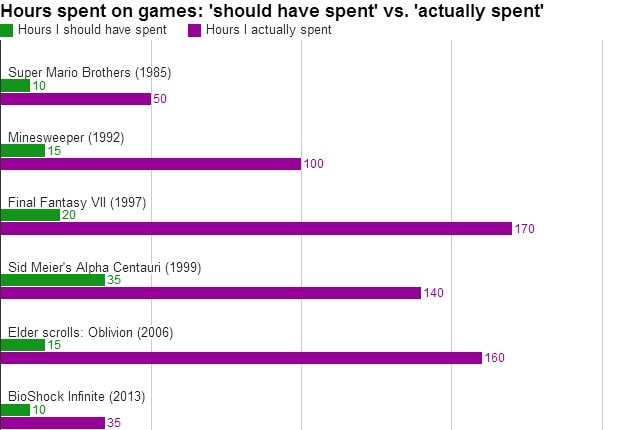
I find that there are many good reasons to play a game, but that I often keep playing long after I exhaust these reasons. Essentially, each game has a finite number of hours of productive play, during which it's offering you new knowledge and experiences. In this period, each hour spent on the game is worthwhile and enriching. But after this limited number of hours, playing the game further is likely to be a waste of time. This suggests that I characterize the games I've played with two numbers: the hours I should have spent on the game, and the hours I actually spent on the game. I then use these numbers to make these charts.
The "hours I should have spent" on a game requires some more explanation. As I said, I'm looking at all this with the perspective of a parent or a teacher. So to come up with this number, I asked myself: how many hours of playing this game could a teacher justifiably assign as homework, assuming that the student is the past version of myself just before I started playing the game? For example, the graph above says that I "should have spent" 20 hours on "Final Fantasy VII". That means "Final Fantasy VII" had 20 hours of productive gameplay during which I learned and experienced new things, which benefited me to the point that these 20 hours could be justifiably assigned as homework. Assuming 2 hours of homework per day, 10 hours is one week, so 20 hours of homework means that a student can productively study "Final Fantasy VII" for two weeks - comparable to the time an English class might devote to "Romeo and Juliet".
Note that the amount of learning depends on who the students are. This is why it's important that I specified "the student is the past version of myself just before I started playing the game". If the student is my current self, I would obviously learn less than 20 hours worth of lessons from "Final Fantasy VII", since it is now an old game and that I have already experienced. Likewise, you might not agree with my value of 20 hours, since we have different past experiences. So the "hours I should have played" represents the productive hours of learning and experiences that I uniquely had as a result of playing "Final Fantasy VII".
The "hours I actually spent" on a game is much more straightforward: it is exactly what it says. However there are sizable uncertainties associated with these numbers, as they were constructed from old memories and rough estimates.
But enough about the procedures - let's look at the games.
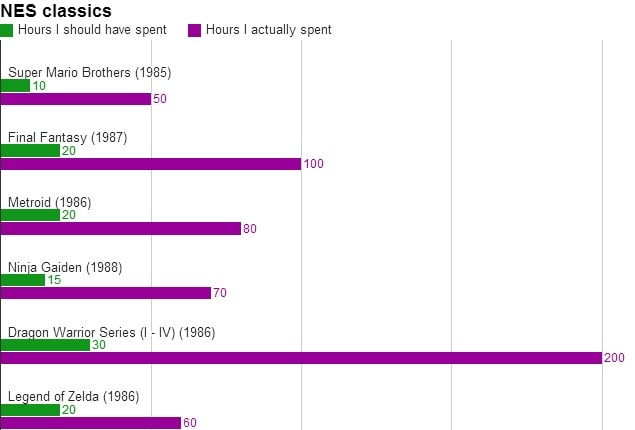
All of the classic NES games were worth playing, if only for their value as cultural landmarks. Not knowing about Mario, Link, or Samus is like having never heard of "Les Miserables" or Hans Christian Andersons's fairy tales. These games introduced me to an entirely new type of media, and I would have been cut off from this vast new swath of human experiences if I had never played them.
Of course, the games each had their individual merits as well. "The Legend of Zelda" sticks out in my mind as being exceptional. On a strictly pedagogical level, I remember actually going to a dictionary and looking up specific words so that I can better progress through the game. "Forest", "secret", and "north", "south", "west", "east" are all among the English words I first learned from "The Legend of Zelda" (I am not a native English speaker). It is also noted for introducing what it means to "save" something in a digital medium. More importantly, this game taught me patience and exploration with its numerous secrets - the walls you can bomb, the trees you can burn, and the blocks you can push - in a way that made me experience these lessons instead of simply telling it to me. Also, the game system was complicated enough that there was quite a bit of work to do to figure it all out. How much more powerful was the magical sword than the white sword? What did the blue ring do beyond changing the color of Link's clothing? Why buy a shield when Link apparently already had one? What effect did the boomerang have on different kinds of enemies? Answering these questions taught me to observe, form hypotheses, investigate, and draw conclusions; it taught me a rudimentary form of the scientific method.
Each of the other games taught me many things as well, but I will only mention a few of them: I remember trying to make a complete map for "Metroid". It was beautiful - it had color codes for every important feature in the game terrain, including the different types of doors, the lava you can stand on, the walls you can break or walk through, the location for the energy tanks, items, and missiles, all that. It would have made any teacher proud to have me turn in that map as an assigned project. Many teachers have tried and failed to teach their students the systematic thoroughness that I put into that map, but "Metroid" taught it to me.
The first "Dragon Warrior" game was a novel concept that established the Japanese RPG genre, but it was a simple game that was quickly eclipsed by "Final Fantasy". However, each of its sequels made steady improvements, until "Dragon Warrior IV" told one of the best stories in video games that holds up well to this day. This is the game that completely convinced me that video games had potential as an artistic, storytelling medium, and demonstrated specific mechanics and tropes that could be used to this end.
Now, all these games were instructive, but as you can see from the graphs so far, I played them too much. It's one thing to learn exploration and patience while playing "Zelda", but it's a tedious waste of time to try to burn every single tree in the second quest in a futile search for a heart container. Yet partly because of my personality, and partly because of the game design, I often ended up doing such fruitless things while playing video games.
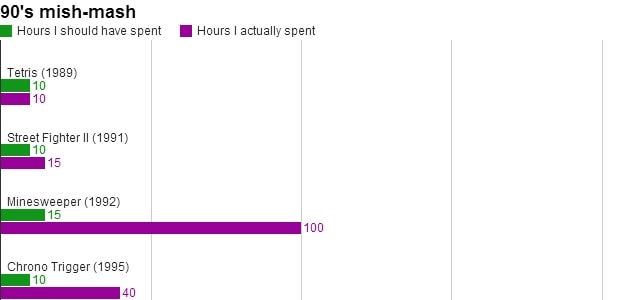
For better or for worse (I'm genuinely not sure which), I didn't get a Super Nintendo, so I skipped this whole generation of console games. So the games I played here were a random assortment from different platforms. I'm quite pleased with the amount of "Tetris" and "Street Fighter II" I played - enough to get a sense of the genre and experience some of the strategic depth, yet not to the point of obsession.
"Minesweeper" is the game that I eventually obsessed over in this group. Now "Minesweeper" has much to teach its player - it obviously teaches logical thinking, and if you go slightly deeper there are some great probability problems for you to solve when you're forced to guess. Also, people expect you to be familiar with it and will use it as an example, such as when they say "Minesweeper is NP-complete". Furthermore there is some benefit to playing to beat your record time. It's worthwhile to see that you can improve greatly with some practice, to get numbers that you would have previously thought impossible. But again, this eventually turns into a tedious waste of time. My record time on 'Expert' is something that I'm both proud of (because its decently good) and ashamed of (because I wasted a lot of time getting it) - but probably more "ashamed", as it's a record that I don't even remember exactly anymore.
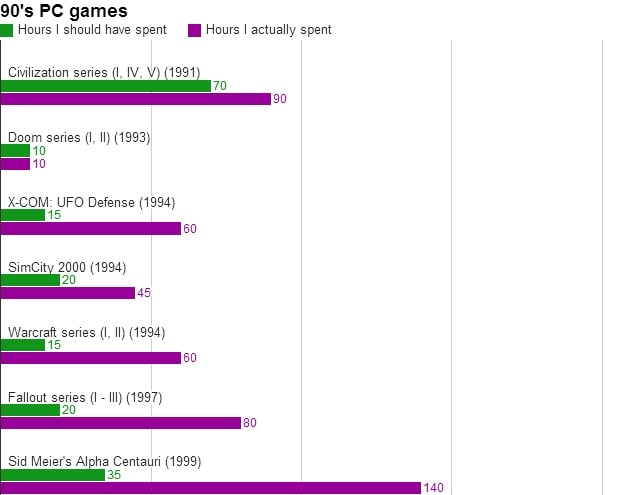
Here, the games that I must draw attention to are the "Civilization" series and their spiritual successor, "Alpha Centauri". These are some of the best games ever from an educational point of view. If I were to teach the appropriate history class, I would assign "40 hours of playing Civ V over the summer" as homework without hesitation. Numerous times while reading history, historical analysis, or even current events, I've said to myself, "That happened in one of my Civ games!" Jared Diamond's "Guns, Germs, and Steel" in particular stands out in my mind as a book whose main points were often well illustrated by some of my past "Civilization" games. They illuminated many of the various facets of history to me. "Alpha Centauri" replaces history with philosophy and a discussion about the future of humanity. The leaders of each of the factions have compelling, memorable personalities, and I still remember many of their quotes from technologies, secret projects, or new buildings - that's the kind of information retention that many teachers dream of for their students.
The other game worth mentioning here is "X-COM". On a concrete level, this game was the first thing to clearly explain to me the difference between a scientist and an engineer (The scientists researched alien artifacts, then the engineers could build them). I also learned about what it would be like to run something like the X-COM - about the political and multidisciplinary effort that such an endeavor would take. As I didn't play Civilization until 1995, X-COM was the first game I played that involved running an organization, where elements beyond the raw power of my characters were important factors in victory.
Also, we again encounter in this group my compulsive tendency to play a game well past its period of productivity. "Alpha Centauri" was well worth playing and sinking many hours into, but I probably shouldn't have played it to the point where I was completing single-city challenges on Transcend/Ironman using as few turns as possible.
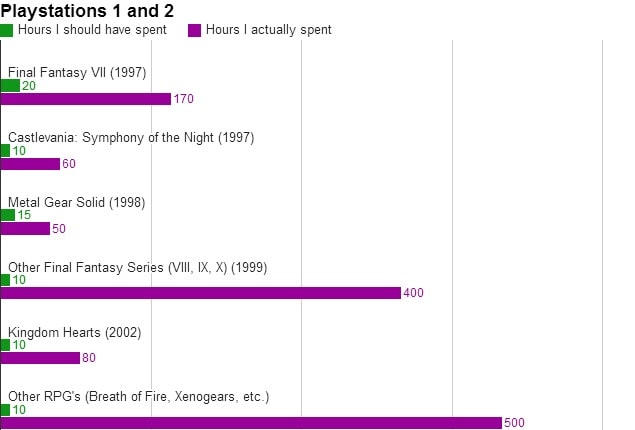
Earlier, I compared "Final Fantasy VII" to "Romeo and Juliet" - this comparison is perhaps quite a stretch, but not to its breaking point. "Final Fantasy VII" has a great story told with tools and artistry that really pushed the boundaries for its time, and brought video game storytelling to a new level and a new audience. It's worth studying if only for its place in video game history. While much of its graphics and game mechanics are quite dated now, I would still love to see it eventually refurbished and re-released for its great story. It's perhaps the game that I personally remember the most fondly.
Unfortunately, while "Final Fantasy VII" was worth playing, virtually none of the other RPG's in this era were - at least, not from a parent or a teacher's point of view, not after having already played "Final Fantasy VII". Note the change in scale in the above graph - its maximum value is no longer 200, but 600 hours. Thanks to the loyalty that "Final Fantasy VII" generated in me, I sank about a thousand hours of my time into mediocre other RPG's, that I didn't even enjoy all that much. Sure, there were some decent stories in some of these games, but not nearly enough to justify the time I spent on them. In retrospect, this was perhaps the first of my very large mistakes in how I handled video games.
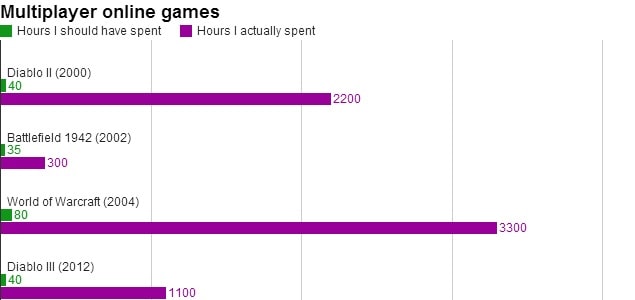
The scale changes again to accommodate some of the largest mistakes I've made in my video gaming history - now the maximum value on the scale is 4000 hours. "Diablo II" was the game that I became completely addicted to. It made me neglect real-life responsibilities and had a significant negative impact on my life. I was pretty terrible. It has the lowest ratio of "should have spent" to "actually spent" among all the games in this post.
Having said all that, its "should have spent" value of 40 hours is actually very high for an individual game - after all, it would not have been so compelling to me if I had not found it interesting in some ways. It was my first online game, and that opened up whole new fields of learning for me. The economy was fascinating, and the game was a remarkable social experiment where some noxious elements (scammers, dupers, PK's, spammers, racists, griefers, etc) were actually encouraged by the game's fundamental architecture and mechanics. "Diablo II" gave me great insights into human nature, at the sociological and economical levels. The mechanics were also deep, and that combined with the utter lack of balance in an online game environment where balance actually mattered, made me take my theorycrafting to a new level, augmenting the scientific method I mentioned earlier with model-building.
"Battlefield 1942" was another great game - it was the first game to truly make me appreciate the art of war, and it also taught me quite a bit of history. Of course, I played this one too much as well.
That then brings us to "World of Warcraft". The 3300 hours I spent on it is actually not as bad as it looks, as that's spread out over nearly a decade of playing the game. It's the great longevity of this game that's mostly responsible for it having the most number of hours on it. I wasted a lot of time on it, but at a relatively low rate, over many years.
Being such a large game, it also has the highest number of "hours I should have spent", at 80. "World of Warcraft" taught me many different things. In tinkering with the user interface (UI), I actually learned a decent amount of programming and UI design. As someone who prefers to work alone, "World of Warcraft" taught me a few things about working in groups and the importance of good leadership. Between this game and "Battlefield 1942", I learned a great deal about the principles of warfare. "The Art of War" makes much more sense to me now that I've played these games. Theorycrafting this game was also instructive, and some of the story arcs in the game are also worth going through.
It's also here that you see some of the flaws of my system, of characterizing the time spent on video games as simply "hours I should have spent" and "hours I actually spent", with the former being defined as "possible hours of homework". In these terms, "World of Warcraft" is the game I wasted the most time on, but some of those "wasted" times were used for making and hanging out with friends. This social aspect of online games was a relatively new feature for me. While I have no doubt that I played this game far more than I should, it's also the game that comes off looking the worst due to the particular system of game characterization that I've chosen.
"Diablo III" also suffers from the same kind of problem - I did in fact waste a lot of time on it according to the standards I set, but it's also true that some of the time was partially redeemed by playing with friends. Apart from that, "Diablo III" was notable for its real-money auction house. All the economic lessons from "Diablo II" and "World of Warcraft" now carried over and openly interacted with the real-world economics, and watching that play out was certainly worth spending a great deal of my time to study. Add to this the fact that I made a tidy sum from this interaction, and that bumps up the "hours I should have spent" on "Diablo III" up to 40.
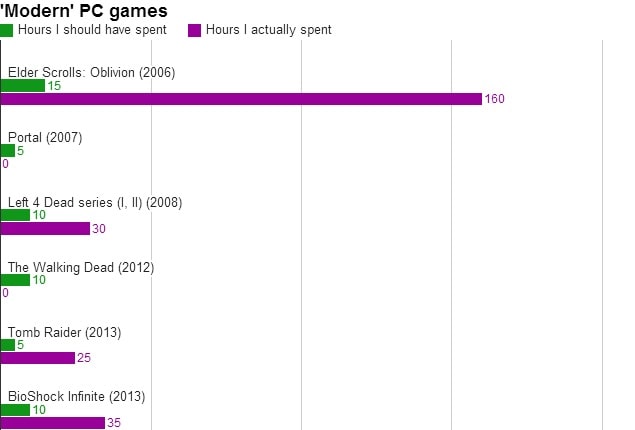
"Portal" and "The Walking Dead" require some explanation. These are games that I didn't actually play myself, but I learned about from other sources. I played a flash version of "Portal", and watched videos on YouTube like "the best of GLaDOS". I also watched a playthrough of "The Walking Dead". Both are games that I wish I had just played instead, and I consider even the time I spent learning about them time well spent.
"Tomb Raider" and "BioShock Infinite" were both good games that I'm glad to have played. If only I didn't play through the game a second time due to my obsessive-compulsive tendencies, I feel I would have done well in handling these games.
Overall, many games in this group represent how I hope I will play games in the future; play quickly through good games without getting addicted to them.
So, what conclusions can I draw from all this?
First, I have absolutely played too much video games, and wasted many hours on them - hours that I now wish I had spent doing other things instead. It's true that some of the differences between "should have spent" and "actually spent" in the above graphs can be redeemed by the fact I was making and hanging out with friends. It's true that there is value in relaxing at the end of a day, that I can't really expect myself to be constantly productive. But even after taking all that into account, I have spent far, far too much time playing video games.
Second, video games are absolutely worth playing. They have taught me innumerable things that nothing else could have, and I'm a more knowledgeable and experienced person for having played them. I would definitely recommend appropriate games to any children that I'm a parent or a teacher to. I believe that they are an important part in the spectrum of human activity that will essentially remain with us forever - like reading or exercising or playing music. My life has unquestionably been enriched for having played video games.
How can I reconcile these two paradoxical conclusions? Going forward, I hope to do so by changing the way I play video games. Looking at my past history leads me to set the following guidelines for myself. I hope they work.
First, I need to stop my compulsive perfectionist attitude with video games. I frequently play through a game twice, to make sure I collected every item and understood the whole story. I realize now that this is generally not a productive way to spend my time, or all that much fun for that matter.
This extends especially to my tendency to sink hours of time to build the perfect character, to min-max the game system to the point that there is no challenge and nothing more to accomplish. I think this is perhaps worth doing in one or two games in your gaming career - it's a good exercise in thinking things through - but it's far too time consuming to do often. The thing is, I've already built many characters where I could fall asleep during the most challenging parts of the game and wake up victorious. I don't need to have that experience again, nor is falling asleep while playing all that much fun.
The same goes for the player vs. player games: I've already fought numerous battles where I had a kills:death ratio of 30:0 or better. I've been there and done that. I don't need to have that experience again. Being that good at a game takes time that I could better spend elsewhere.
I will also not play games simply because of its genre. I don't need to play the 4th best RPG of the year after I've played the first three because I like RPG's. I'd rather play the best puzzle game instead. This will save me from wasting time playing a string of mediocre games.
I will also count a game's lengthy play time against it rather than for it. It's a little weird, if you think about it - it's as if a movie were advertising itself as being four hours long, or a book were to advertise the fact that it's the first 1000 page book in a seven-part series. It makes sense if you're looking to kill the most time on a limited budget, but I'm not looking to kill time.
I will also recognize the boring, grinding parts of the game, and speed through it as quickly as possible, using cheat codes, game guides, or a lower difficulty if necessary. If you look at the numbers in the charts above, many games have "hours I should have spent" that are less than the playthrough time of the game itself, due to some lengthy, grinding sections of the game. I will speed through these parts to get to the meat of the game.
I will also recognize when the game ceases to become fun, when I find myself playing simply because of some psychologically manipulative Skinner box trick that the game has pulled on me. I can find more fun and productive things to do elsewhere.
Feel free to suggest other guidelines to me. I also hope that game developers make better games. Video games can be designed to waste less of the player's time, and make it easier for players to adhere to these guidelines. But the developer's side to this issue is another beast altogether, better dealt with in another article.
Ultimately, I want to make the most of my time. There is wisdom in counting my hours and my days as limited and valuable things. There are many things I want to do in life, and video games can both help and hinder me in these goals, depending on how they're played. The time spent on them is worthwhile insofar as they help me achieve my goals, and wasteful if they hinder me.
You may next want to read:
6 comments on “Time spent on video games: worthwhile or wasteful?”
Leave a Reply
You must be logged in to post a comment.
Post Importance
Post Category
• humanities (26)
• current events (30)
• fiction (10)
• history (36)
• pop culture (14)
• frozen (8)
• math (58)
• personal update (19)
• logic (65)
• science (56)
• computing (16)
• theology (104)
• bible (39)
• christology (10)
• gospel (7)
• morality (23)
• uncategorized (2)
I never was much of a gamer, to be honest. That said, I've never been a member of the "video games have no worth" crowd, either. Either way, your observations on the need to play video games wisely and sufficiently make a whole lot of sense.
I think a whole lot of debate in the world probably could be resolved in similar ways, where there is clearly a good and a bad way to do or use something. But unfortunately, "Video games are evil" or other similar simplistic and extreme views dominate the press and the debate.
WoW is a great game. I'm also a WoWer. Theorycraft and addon modification is interesting. As a PVP player, I spent much time establish an optimal UI environment that detects and reports faster, shows more important information and operates more efficiently and intelligently. My WoW friends also benefit from my study on WoW UI and tweaks.
WoW may be a waste of time and may be not. The art and quests are good, sometimes playing WoW is more creative than doing the so-called academic research! But playing many hours a day raiding or RBG/arenas for high rank is boring, a waste of time.
If I realize I'm wasting time, it's better to close WoW-64.exe.
Oh! I forgot to mention WoW played a role in my conversion to Christianity. My paladin character "Theona" raised my interest in Christianity. Divine Intervention is a very beautiful ability: sacrifice paladin him/herself to protect the one he/she loves 😀 But sadly it's removed :<
Oh, awesome! I did actually learn a lot from playing WoW. I just have a tendency to overdo things, which I hope to curb.
Haha, awesome! God uses everything! You should also look at my 'universe is an MMO' post. It's another way of relating WoW to Christianity, from a different level.